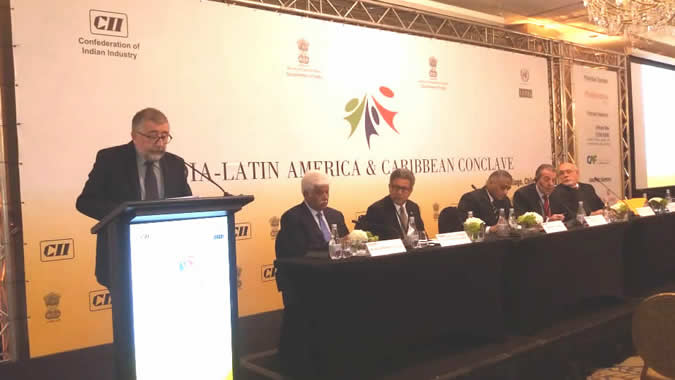ECLAC: There is Great Room for Deepening Ties between India and Latin America and the Caribbean
Mario Cimoli, ECLAC’s Deputy Executive Secretary, participated in the inauguration of the eighth India-Latin America and Caribbean Conclave, which is being held in Santiago, Chile.

“There is great room for deepening the ties between India and Latin America and the Caribbean. In economic terms, we can make progress through long-term and new generation trade, technological and productive agreements,” said Mario Cimoli, Deputy Executive Secretary of the Economic Commission for Latin America and the Caribbean (ECLAC), who participated on behalf of Executive Secretary Alicia Bárcena in the inauguration of the eighth India-Latin America and Caribbean Conclave, which is taking place in Santiago, Chile.
There is ample room for growth in trade, foreign direct investment and South-South cooperation, Cimoli stressed during the opening session of the event organized jointly by ECLAC, the ministries of External Affairs and Commerce and Industry of India, and the Confederation of Indian Industry (CII).
At the inauguration of the conclave – the second one to take place in Latin America and the Caribbean – additional participants included General Vijay Kumar Singh, Minister of State for External Affairs of India; Rakesh Bharti Mittal, President of the Confederation of Indian Industry; Carlos Castaneda, Minister of Foreign Affairs of El Salvador; Orlando Solórzano, Minister of Development, Industry and Commerce of Nicaragua; and Eduardo Frei Ruiz-Tagle, former President of Chile and Special Presidential Envoy to Asia-Pacific.
India and Latin America and the Caribbean share a strong commitment to global governance through multilateralism and, in a complex international context, their trade relationship can help the countries of Latin America and the Caribbean to transform their productive structure, contributing to industrialization, diversification and digitalization of the economy, explained Cimoli, who, after his opening remarks, addressed the challenges and opportunities present in trade and investment.
Despite the fact that bi-regional trade continues to grow at double-digit rates, India currently represents just 5% of regional exports and 4% of imports, the senior official indicated, citing the document Strengthening the relationship between India and Latin America and the Caribbean, published recently by ECLAC.
These trade ties are highly concentrated, both in terms of markets and products, he said. Crude oil represents 44% of the region’s exports to India, and, if non-monetary gold, vegetable oils and copper-ore are added, that percentage rises to 66%. On the other hand, the automotive sector accounts for more than 20% of Indian exports to the region.
Similarly, more than 55% of Indian exports are destined exclusively for Brazil and Mexico. If Colombia, Chile and Peru are included, this reaches 75%. On the other hand, six countries of the region (Venezuela, Brazil, Mexico, Argentina, Peru and Chile) concentrate 88% of regional shipments to India.
Although food offers an opportunity for regional insertion into the Indian market, Cimoli contended, officials must not neglect the diversification of the export basket, the incorporation of value and environmental sustainability. Industrial promotion must include, for example, the development of a sector linked to renewable energies. Opportunities have also arisen in the entertainment industry, among others, he said.
“The development of the relationship between both regions has to be accompanied by a debate regarding structural change,” ECLAC’s Deputy Executive Secretary sustained. The best approach, he stated, may be the creation of partnerships around value chains, with the aim of increasing the sophistication of manufacturing based on the natural resources that the region exports to India. The same can be said of trade in services and of investments.
Social policies constitute another great space for cooperation, maintaining a perspective of mutual benefit, Cimoli asserted, considering that Latin America and the Caribbean has made significant progress in recent years in areas such as the reduction of poverty and malnutrition, and gender equality, he concluded.
Related content
Type
Country(ies)
-
India
- Latin America and the Caribbean
Related link(s)
Contact
Public Information Unit
- prensa@cepal.org
- (56 2) 2210 2040